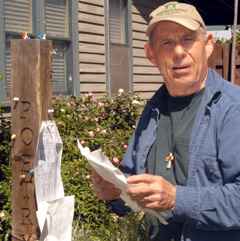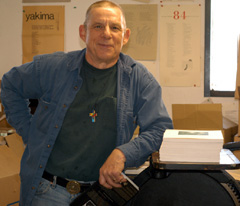Latino students, El Salvadorans open poetic sights
English teacher Jim Bodeen planted a poetry pole in his garden 10 years ago to give voice to passing poets.
 |
Jim Bodeen and his poetry pole. |
His journey to nurture poetry now includes publishing poetry and essays of Latino students in the Yakima Valley and a new voice arising from encounters with Lutheran Bishop Medardo Gómez of El Salvador.
Poetry—mixed with lives and stories of people he encounters and publishes—is his calling.
Just as the garden by his Yakima home has become a place where lives intersect “along the path of the mailman and the butterflies,” so, too, his publishing books of poetry and essays by young Latinos has allowed those field workers’ and students’ lives to intersect with more people.
A March visit to El Salvador, Jim said, has “entrusted me with the subversive cross” and instructions to tell the living story of El Salvadorans.
Jim began by telling about the poetry pole.
“Planted in an out-of-the-way place, the poetry pole is a source of truth. Poems here are written directly to the muse without editors intervening,” said Jim. “Poetry poles are places to share spiritual insights, longings, and truth.”
Weathered Pages: The Poetry Pole, a book with submissions of 132 writers—66 women and 66 men—has just been released.
On a sabbatical in Chile, Jim made a pilgrimage to the home of Pablo Neruda at Isla Negra. There he found people writing poems and notes on Pablo’s fence post.
People learn of poetry poles by word of mouth, said Jim.
 |
Jim Bodeen in his print shop |
For 25 years, he has printed poetry people tack on his pole. A shed behind his home houses Blue Begonia Press, a letterpress, with which he published poetry on broadsides and in hand-sewn, limited-edition chapbooks until the 1990s, when he shifted to computer publishing.
Now he sends books as digital files by internet to Michigan to be printed and bound in 1,000-run paperbound editions.
“No poet makes a living writing poetry. It’s my calling,” said Jim who has taught literature and writing at Davis High School in Yakima for 33 years. He left the classroom last year to write full time and “go deeper into stories and listening.”
Born in a small town in North Dakota, he graduated from high school in Seattle and was in the army in charge of medical evacuation in Panama and Vietnam.
He returned to Central Washington, earning a master’s degree in English at Central Washington University in Ellensburg in 1971. He also attended Seattle University’s summer programs on Vatican II for three years with his wife, Karen—the only Lutherans studying Lutheran theologians with Catholic priests and nuns—earning a second master’s degree in religious education.
“In 1988, I became aware of the cycle of migration into the Yakima Valley that meant Latino students came and went from classes, and that many in my English classes spoke Spanish,” Jim said.
On spring break, he found them in asparagus fields. He followed them for three years to learn their stories, which he published in “The Asparagus Journal.”
The students read their stories live on stage throughout the state, at the Seattle Repertory Theatre Bumbershoot Arts Festival and at a National Migrant Conference.
While giving them voice, he watched them grow up and settle in the Yakima Valley or go on.
Alberto Cardenes, who picked strawberries, is now a teacher and wrestling coach at Eisenhower High. José Garcia is cross-country coach at Davis. Another student, Eloisa Gonzales, graduated from Gonzaga University and works for a newspaper in Delaware.
Jim improved his Spanish in 1991, after the Gulf War resurfaced his post-traumatic stress from the Vietnam War. He had a seizure that temporarily blinded him and paralyzed one side of his body. So he spent a summer in Chile, taking a Latino literature course, connecting with youth and working with Mapuche Indians on a Fulbright scholarship.
“I began to understand the connection of the external and internal worlds, learning about healing from a Mapuche healer called ‘The Machi.’ I realized I had carried stress from Vietnam into my family living room.”
Creative times of writing poems and of learning to write, live and teach followed his experience in Chile, Jim said.
Because of The Asparagus Journal and the summer in Chile, the school asked Jim, who considered himself a beginner in Spanish, to teach a Latino literature course.
Jim has edited and published two collections of poetry and essays: With My Hands Full (Con Mis Manos Llenas) and Seeking Light in Each Dark Room (Buscando Luz in Cada Cuarto Oscuro), in 2002 with a grant through the Yakima schools.
“The first book was raw,” Jim said. “The youth wanted to do another. The second one has 120 pages of interviews with the teens and their parents—telling how they came to Yakima, sharing the Mexican insight that “each time an old person dies, a library burns”—that each person is a library of stories and information.
“Youth have taught me through their stories. They became my children through the power of sharing their stories,” Jim said. “Many are illegal, so their stories also touch law and justice issues.
“Their stories are theology,” he asserted.
Jim recently saw Albion, a former student, at the YMCA and learned a new part of his story that makes Jim realize these students’ futures are limited by laws. For example, Albion has to pay out-of-state tuition to go to college.
“These children are the future of this valley,” Jim affirmed.
In 2002, a new door opened for Jim while he was enroute to the Abriendo Caminos—Opening Paths—summer retreat week at Holden Village. He, Karen and a group of Latinos were crossing Lake Chelan, sitting on the deck of the Lady of the Lake.
A friend introduced him to “El Salvador’s Bishop of Peace.” Bishop Medardo Gómez was also going to teach that week in Holden.
“He looked at me and said, ‘If you want to write the best poems of your life, come to El Salvador.’
“Crossing the water is always a conversion experience. Literature teaches us this. Still I was caught off guard,” Jim said.
It took him two years to go—in February and March, 2005—to be with Medardo and glimpse into his story, the story of El Salvador and his people.
Jim found it a conversion experience. He learned that, during the civil war in El Salvador, people from U.S. churches came regularly to be in solidarity with Medardo, as human shields to protect him from being arrested. Bishop Martin Wells of the Eastern Washington Idaho ELCA Synod was among those shields. Bishop Gómez was at Bishop Wells’ installation as bishop.
Jim walked with Medardo, going where he walks with his people, with God, visiting the places of martyrs, a coffee plantation and a Habitat for Humanity project.
“He was inviting me to walk in accompaniment as fully as I was able in his work with his people,” Jim said.
Medardo gathered poets from San Salvador to meet with Jim, invited him to travel with his team of pastors, took him into his office to meet with people in desperate daily situations and included him in a workshop with more than 100 pastors discussing the Lutheran Church’s deepest problems.
Proclaiming a prophetic ministry, Medardo struggles daily to minister to poor and marginalized people. His wife, Abelina, also a pastor, helps in the Lutheran Refugee Camp.
Jim also learned of needs of El Salvadorans while helping build a Habitat for Humanity house. In that week, he found that “questions mixed with cement.”
His boss, José, a skilled worker, asked how much he would earn in the United States for his $15-day of work. He builds 10 houses a year.
Jim told José about his own life, saying that he and his wife both work. Working in a bank, his wife earns more than he does as a teacher, but he earns more than teachers in El Salvador. They have a house with two bathrooms, a garden, two cars and two dogs. They work hard. Their three children have jobs, speak Spanish and live on their own. Jim also learned about José’s life.
“In El Salvador, workers make less, and corporations now have more power than the government,” said Jim, who returned with a new way of seeing and a new voice for speaking.
“It’s easy to forget the civil war and refugees, but the peace process, too, has left the country and its people impoverished. El Salvador is a microcosm of globalization and the story of poverty. The Lutheran Church there is out front walking with the poor. Jesus is present there in a way Jesus is not present here,” Jim observed.
“Jesus walks with the crucified people, doing what Medardo—who attended the church of Archbishop Oscar Romero as a boy and now walks in his shoes—does,” he said.
Jim read Romero’s biography and studied the liberation theology of theologian Jon Sobrino in his book, Where Is God?
“I realize in a new way that Jesus is with the crucified people, with earthquake and hurricane victims,” he said.
“Medardo changed my life. Walking with him and the people he loves and serves shows me we need what they have as much as they need what we have,” Jim said. “We are stronger when we do it together.”
In a recent poem, “The Trouble with Crosses,” he wrote: “I’ve stood before the cross all my life. I thought I understood. I thought it was resurrection I didn’t understand.”
“I went to El Salvador to walk with the bishop until I understood what he was calling me to do. I’m still finding out,” said Jim, who has joined Medardo’s Church of the Resurrection.
While he was there, a death squad killed a guard at a university, as in the days of war. Medardo wailed. Jim felt helpless, but discovered la cruz subversiva—the subversive cross.
“That cross was then born in me,” he said.
Medardo gave him wooden crosses made from houses destroyed by earthquakes. For Jim, these crosses carry “instructions to tell a living story.”
Jim returned from a week-long June visit to El Salvador with an appeal for medicine, blankets, food and money to help people following hurricane damage there.
“Dimes,” one of several poems he wrote in El Salvador, presents the story, which he feels entrusted to tell.
For information, call 452-9748 or email bodeen22@charter.net.
By Mary Stamp, Fig Tree editor - Copyright © September 2005




